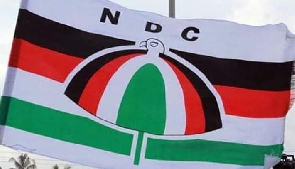 National Democratic Congress (NDC) flag
National Democratic Congress (NDC) flag
H.E. John Dramani Mahama, the flagbearer of the National Democratic Congress (NDC) on several fora last year assured Ghanaians that he would ensure that the true voice of Ghanaians would be reflected in the upcoming 2024 General Elections.
“We are going to leave no stone unturned. We will make this election a true reflection of the people's will. We are going to make sure that the people’s votes are protected. I have heard enough of people walking up to me and telling me we voted for you but you did not protect our votes," he said.
There are numerous ways in which the integrity of elections can be compromised. Voters can be physically barred from exercising their franchise through intimidation or threats.
Election results may be improperly tallied or reported. These inaccuracies may be introduced by malicious actors when there is lack of vigilance.
Registration data may be altered to disenfranchise voters while voting equipment failures could be planned, and inadequate electoral materials could be orchestrated to prevent vote collection.
There are others: results can be affected through multiple and illegal voting. And electoral equipment could be manipulated to slow the electoral process in the strongholds of opponents.
Gerrymandering, unclear voting locations, late start of voting processes, etc. may be manipulated to frustrate potential voters.
The decision of the EC to conduct limited voter registration at its district offices from September 12 to October 2, 2023, for instance, sounded problematic which led to the filing of a suit at the Supreme Court by five political parties, calling for more centres to be created because of the inconvenience that would cause illegible voters due to the proximity between their places of abode and the registration centres.
The fears of the five political parties who filed the unsuccessful suit seem to have been justified by some occurrences during the recently held district-level election where it was reported that many new registrants could not vote because they could not locate their polling stations.
Even though these political parties were resilient in getting their constituents to register by supporting them with means of transport in most instances which is one of the positive ways to solve the problem, they did not apply the same enthusiasm to encourage their constituents to ensure that everything was okay during the exhibition of the register.
The determination to protect votes must not be focused on electoral strategies and machinations of the ruling party only. The NDC must also watch within. There is a saying that, when there is no enemy within, the enemies outside cannot hurt.
For example, in the 2016 elections, there were some constituencies where phones meant for transferring election results were not used for the intended purpose but kept and shared amongst cronies of some NDC constituency executives after the declaration of results. Also in some cases, food for NDC agents arrived as late as 2 p.m. resulting in some NDC agents accepting food distributed by the ruling party.
Such internal acts and others must be looked at by the leadership of the NDC during this year's elections for the resolve to protect votes to be fruitful.